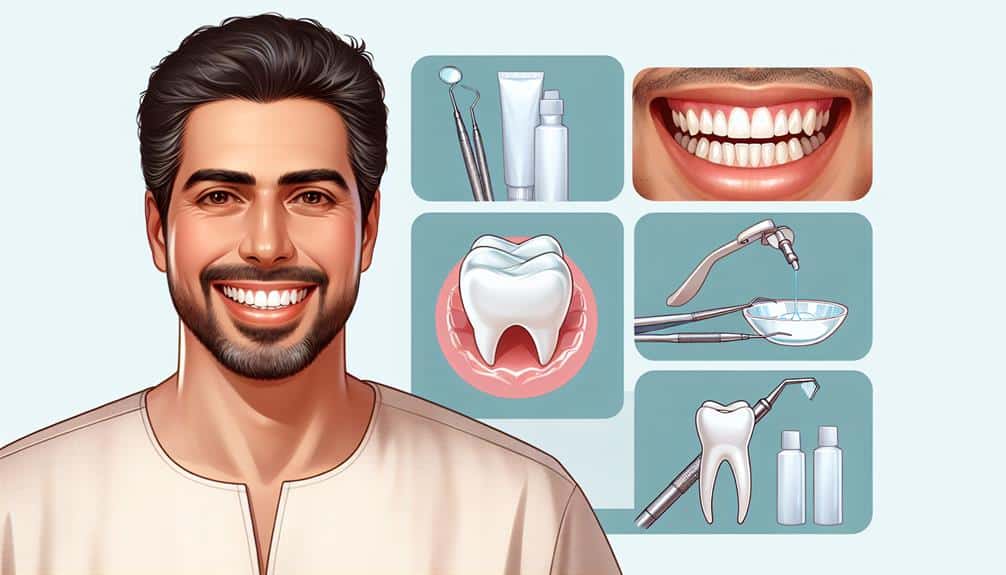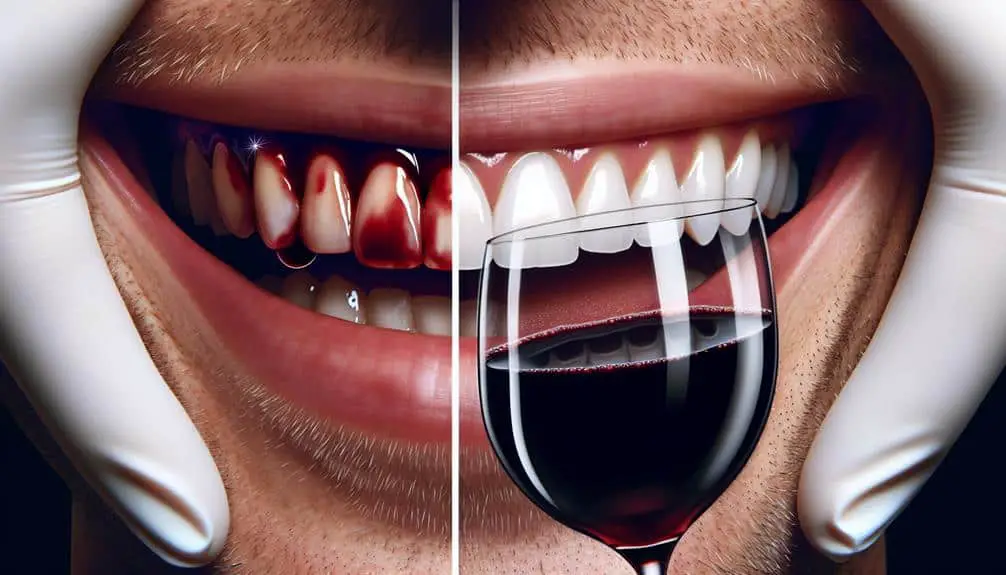Achieve a brighter smile with these 7 activated charcoal tips. Use its natural adsorbent properties to lift stains for whiter teeth. Apply it carefully to prevent enamel damage, and manage timing for safe use. Maintain results by incorporating charcoal products into your routine. Seek professional advice for effective whitening and safe usage. Remember, proper flossing techniques are essential for oral health. Consider charcoal mouthwash to reduce bacteria and bad breath. Enhance your smile with these tips and discover the power of activated charcoal for brighter teeth.
Key Points
- Use activated charcoal sparingly to prevent enamel damage.
- Follow recommended application techniques for safe teeth whitening.
- Incorporate daily oral hygiene practices post-whitening.
- Seek professional advice for optimal charcoal whitening results.
- Limit staining foods and drinks to maintain a bright smile.
Benefits of Activated Charcoal for Whitening
To achieve brighter teeth, consider the benefits of using activated charcoal for whitening. Activated charcoal has gained popularity for its cosmetic applications in teeth whitening. Beyond its external use, the dietary benefits of activated charcoal extend to detoxification within the body. When used for whitening teeth, activated charcoal acts as a natural adsorbent, attracting and removing stains and toxins from the teeth's surface. This process helps to achieve a brighter and whiter smile.
In terms of dietary benefits, activated charcoal is known for its ability to bind to toxins in the digestive tract, aiding in their removal from the body. This detoxifying property can contribute to overall oral health by reducing the presence of harmful substances in the mouth. Additionally, the use of activated charcoal for teeth whitening is a cost-effective and natural alternative to traditional whitening treatments. By incorporating activated charcoal into your oral care routine, you can harness its dual benefits of whitening your teeth and supporting your overall health.
How Activated Charcoal Works on Stains
Activated charcoal works on stains by effectively adsorbing and removing impurities from the surface of your teeth, helping to reveal a brighter smile. The stain removal process involves activated charcoal's porous structure that binds to the particles causing discoloration on your teeth. This binding action is due to the chemical composition and reaction properties of activated charcoal, which make it highly effective in attracting and trapping unwanted substances.
The effectiveness of activated charcoal in removing stains lies in its ability to adhere to a wide range of compounds, including those responsible for tooth discoloration. Its porous nature provides a large surface area for adsorption, allowing it to trap stains and impurities effectively. This process helps lift stains off the teeth, resulting in a cleaner and brighter appearance.
Activated Charcoal Toothpaste Application
Enhance your oral hygiene routine with the proper application of charcoal toothpaste. When using charcoal toothpaste, it's crucial to employ effective application techniques to achieve the best results. Proper usage of charcoal toothpaste can help in removing surface stains and whitening teeth.
To apply charcoal toothpaste correctly, start by wetting your toothbrush bristles. Squeeze a pea-sized amount of charcoal toothpaste onto the brush. Brush your teeth in gentle, circular motions for about two minutes. Make sure you reach all tooth surfaces for even cleaning. Rinse your mouth thoroughly, ensuring to eliminate all traces of the charcoal toothpaste.
Consistent and proper application of charcoal toothpaste can lead to effective results in brightening your teeth. However, it's crucial to use charcoal toothpaste in moderation to prevent excessive abrasion on the enamel. By following the recommended application techniques and incorporating charcoal toothpaste into your oral care routine, you can work towards achieving a brighter smile.
Precautions When Using Activated Charcoal
When using activated charcoal for teeth whitening, it's important to take safety precautions and potential side effects into account.
Remember to consult with your dentist before starting a charcoal regimen to make sure it's safe for your oral health.
Be mindful of any changes in your oral cavity or overall health and discontinue use if any adverse effects occur.
Safety Precautions to Consider
Consider these safety precautions before using activated charcoal for teeth whitening to guarantee a safe and effective experience.
First, make sure you're using activated charcoal specifically designed for oral use, as other forms may be harmful.
Next, be cautious with frequency; using it daily may be too abrasive for your teeth.
Always follow the recommended usage instructions to prevent enamel damage.
Additionally, it's important to consult with your dentist before starting any new oral health routine, especially if you have existing dental issues.
Finally, remember that activated charcoal may cause staining in some individuals, so be mindful of this potential side effect.
Prioritize your oral health by incorporating these precautionary measures and safety tips into your teeth whitening routine.
Potential Side Effects
To minimize potential side effects when using activated charcoal for teeth whitening, make sure you follow recommended usage instructions and consult with your dentist beforehand, particularly if you have existing dental concerns. While activated charcoal is generally safe for most people when used correctly, there are potential risks to be aware of.
One of the common misconceptions is that activated charcoal is abrasive and can damage enamel; however, activated charcoal used in teeth whitening products is finely milled and safe for your teeth. The effectiveness of activated charcoal for teeth whitening varies among individuals, and it may not provide the desired results for everyone.
Prioritizing your dental health and understanding the potential risks associated with activated charcoal can help you make informed decisions about teeth whitening methods.
Timing and Frequency of Charcoal Use
For best results, make sure you use activated charcoal for brightening your teeth consistently and at regular intervals. When it comes to timing tips, it's recommended to use activated charcoal before brushing your teeth. This allows the charcoal to work on your teeth without interference from toothpaste or other products. For ideal results, consider using activated charcoal 2-3 times a week. Overuse can potentially lead to enamel erosion, so moderation is key.
In terms of frequency recommendations, spacing out your charcoal usage can help prevent any negative effects on your enamel. Recommended practices suggest using activated charcoal at different times of the day rather than consecutively. This allows your teeth to recover between uses and reduces the risk of enamel damage.
Maintaining Results Post-Whitening
To maintain the results of your teeth whitening with activated charcoal, it's important to follow long-term maintenance tips. Preventing new stains by avoiding foods and drinks that can discolor your teeth and establishing a regular touch-up schedule can help preserve your bright smile.
Consistent care and attention post-whitening will guarantee that your teeth remain radiant and white for longer periods.
Long-Term Maintenance Tips
For guaranteeing lasting results post-whitening, incorporating daily oral hygiene practices is essential to preserve the brightness of your teeth. Consider making diet changes by limiting staining foods and drinks.
Regular touch-ups with activated charcoal products can help maintain your teeth's whiteness. Additionally, lifestyle adjustments like quitting smoking can prevent new stains and prolong the effects of whitening.
Establishing a touch-up schedule with your dentist can make sure that your teeth stay bright over time. Remember to brush your teeth at least twice a day, floss daily, and use a whitening toothpaste to help maintain your results.
Preventing New Stains
Enhance the longevity of your teeth whitening results by adopting lifestyle habits that prevent new stains from developing.
To prevent discoloration, it's crucial to pay attention to your dietary habits. Limit the consumption of staining beverages like coffee, tea, and red wine. When you do indulge in these drinks, consider using a straw to minimize contact with your teeth.
Additionally, incorporate crunchy fruits and vegetables like apples, carrots, and celery into your diet. These foods can help naturally clean and whiten your teeth while stimulating saliva production, which aids in washing away food particles that can cause stains.
Regular Touch-Up Schedule
Consider scheduling regular touch-ups to maintain the results of your teeth whitening treatment for a lasting bright smile. To keep your pearly whites looking their best, here are some essential tips for maintaining your smile post-whitening:
- Follow-up Whitening Sessions: Plan periodic touch-up whitening sessions to combat any new stains that may develop over time.
- Use Whitening Toothpaste: Incorporate whitening toothpaste into your daily oral care routine to help preserve the results of your teeth whitening treatment.
- Attend Regular Dental Checkups: Visit your dentist for routine checkups to monitor the condition of your teeth and discuss any touch-up whitening needs.
- Avoid Staining Foods and Drinks: Limit consumption of foods and beverages known to stain teeth to prolong the effects of your teeth whitening treatment.
Professional Advice on Charcoal Whitening
To ensure safe and effective charcoal whitening, consulting a dental professional is highly recommended. When seeking professional advice on charcoal whitening, it's essential to inquire about proper charcoal flossing techniques. Activated charcoal can be abrasive, so using it with caution during flossing is important to prevent enamel damage. Your dentist can recommend specific flossing methods to incorporate charcoal safely into your oral hygiene routine.
Additionally, discussing the benefits of charcoal mouthwash with your dental professional is key. Charcoal mouthwash can help in reducing bacteria, preventing bad breath, and promoting overall oral health. However, it's important to use it correctly to avoid any adverse effects or unintended consequences. Your dentist can provide guidance on the frequency of use and the duration needed to achieve best results without harming your teeth or gums.
Frequently Asked Questions
Can Activated Charcoal Whiten Teeth That Have Been Discolored by Smoking or Drinking Coffee?
To whiten teeth stained by smoking or coffee, use activated charcoal. Brush gently in a circular motion for 2 minutes, then rinse well. Consult a dentist and consider whitening strips for more effective results.
Is Activated Charcoal Safe for People With Sensitive Teeth or Gums?
For those with tooth sensitivity, it's crucial to proceed cautiously with activated charcoal. Prioritize gum health by checking with a dentist before use. Take precautions and consider potential impacts on sensitive teeth and gums.
How Long Does It Take to See Results When Using Activated Charcoal for Teeth Whitening?
For best results when using activated charcoal for teeth whitening, remember that brushing technique matters. Gently brush for 2 minutes, ensuring coverage. Results vary, but many see improvements within a few weeks with consistent use.
Can Activated Charcoal Be Used as a Substitute for Regular Toothpaste?
Yes, activated charcoal can be used as a substitute for regular toothpaste. While charcoal toothpaste offers benefits like whitening and detoxifying properties, drawbacks such as abrasive nature and lack of fluoride may require caution. Activated charcoal toothbrushes can enhance effectiveness.
Are There Any Potential Side Effects of Using Activated Charcoal for Teeth Whitening?
When using activated charcoal for teeth whitening, be cautious of potential risks like enamel erosion or gum irritation. Long term effects may include weakened enamel. To avoid concerns, consult with your dentist before regular use.



